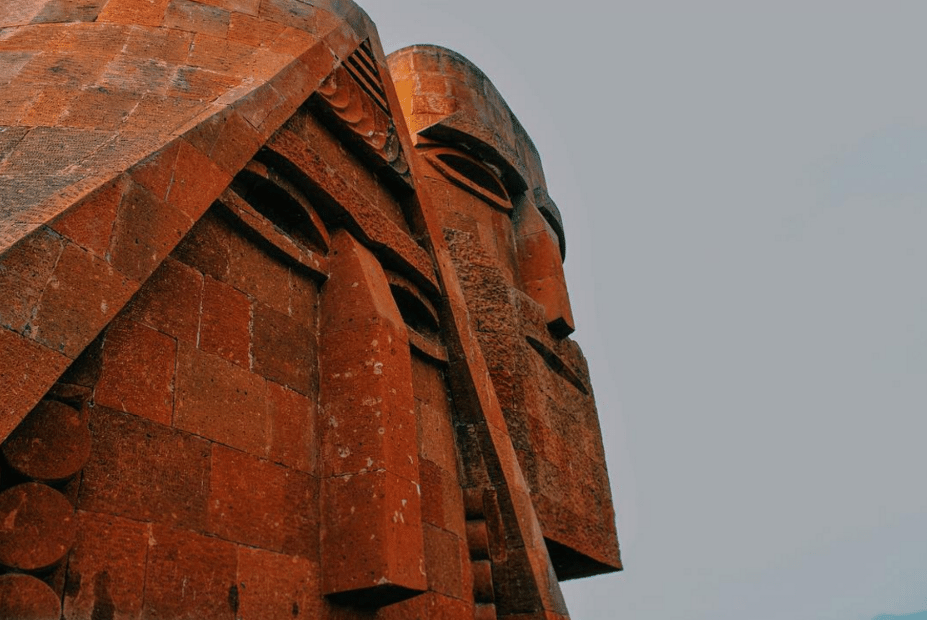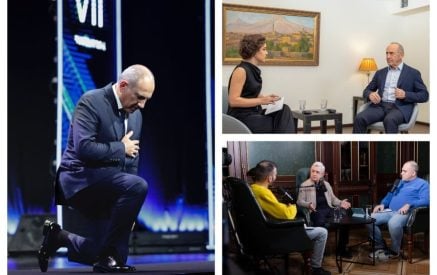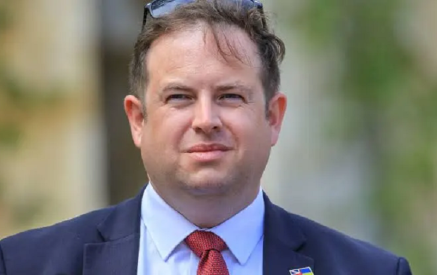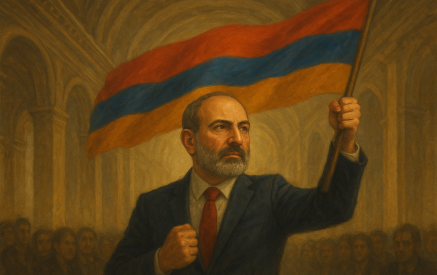Stepan Piligian
The Armenian Weekly
Globally, patriotic Armenians are rightfully feeling less than optimistic these days. Our national security and public aspects of our sovereignty have been usurped, delegated or lost depending on your perspective. Regardless, all three causes are unacceptable for a nation with a vision of freedom and prosperity. Granted, the shadow of the Soviet past has never left and has simply been replaced by the Russian Federation. From the early days of independence, Armenia’s western border with Turkey has been guarded by Russian troops. Looking toward Ararat from Khor Virap, you may see our eternal mountains on a clear day but will see the Russian border stations on every day. This is a result of an arrangement by the Russian-led Commonwealth of Independent States (CIS)—an ironic name for a group that controls the border of a sovereign nation. Most Armenians are comfortable with the Russian bases on Armenian soil and border guards since they are a somewhat invisible presence, and the deterrence against the ever-present danger of the Turks is appreciated.
Since the devastating 44-day war in late 2020, Armenia has been slow to recover from the expected internal turmoil and has been fighting political inertia on the foreign policy front. After laying waste to parts of Artsakh with their illegal and criminal invasion, both Turkey and Azerbaijan have brought forth “normalization” proposals. Now that they have met their short-term objectives of occupying parts of Artsakh while apparently escaping accountability for their war crimes, the olive branches are welcomed by the international community complete with its self-interest based obsession with “stability.” The current situation is not sustainable. Azerbaijan, as usual, talks peace but uses violent measures to force capitulation. Another phase of that strategy is underway with border incursions and attacks on the civilian population to force “peace.” For the rogue dictatorship of Azerbaijan, peace means the destruction of Artsakh and Armenians. An act of genocide is how this barbaric nation defines peace. A recently published list of demands for a peace treaty reads like a request for unconditional surrender:
Read also
Mutual recognition of territorial integrity (this is where they take Artsakh)
No legal claims of territory (once we have it, you can’t get it back)
Refrain from threatening each other’s national security (the method they have used for decades)
Delimiting and demarcating the border with diplomatic relations
Opening transit and communications.
We can disregard #4 and #5 since they have been agreed to in the trilateral agreement in 2020. The combination of the first three essentially assures the loss of Artsakh with the risk of further territorial ceding. Essentially, while Azerbaijan commits war crimes and violations of international law, they present themselves as peace seekers while committing cultural genocide on the Armenian presence of occupied Artsakh. The most immediate danger seems to be a world that would be all too excited to end this conflict without justice for the Armenians based on expediency and an Armenia that seems to lack the resolve to prevail. Armenia’s public response by the Foreign Ministry was that “by and large, there is nothing unacceptable in the Azerbaijani proposals. It does not completely address the comprehensive agenda of Armenia-Azerbaijani peace…the rights of the Armenians of Artsakh and the issue of the status of Artsakh are key in our answers.” Even in the vague and duplicitous world of diplomacy, I cannot understand how a representative of the Armenian government cannot find anything “unacceptable” in the Azerbaijani statements. It seems clear that Armenia wants a peace agreement despite the violent pressure of border incursions and terms that would complete the crime within Artsakh.
We all understand the unfavorable position that Armenia has either backed itself into or been backed into…depending on your view. Our response to the events of late 2020 apparently has been to open up “normalization” dialogue with the two nations bent on our destruction. Obviously, Armenia is being encouraged through direct and back channels. The inept OSCE Minsk Group, chartered with a diplomatic solution to the Artsakh conflict, has already been outflanked by Russia and apparently would have no issue with some other process doing their job. The US would support direct normalization talks between their NATO ally and Armenia. The problem is never the goal of peace with neighbors, rather Armenia seems to be overly cautious about stating its end point vision or red lines. Is there any question about what will happen to the indigenous and heroic Armenians of Artsakh under the Azerbaijani five points? They will be subject to the same atrocities and cultural genocide of the Armenians of Nakhichevan, erasing another historic presence. Is it possible that Armenia would capitulate on Artsakh for peace in Armenia? There are a multitude of analytical opinions on this, and unfortunately many of them suggest a negative outcome.
Our typical reaction as Armenians is to complain about the insensitivity of the world to our plight. Where are the freedom-loving democracies? How can violent dictatorships be rewarded with their aggression? This is particularly painful at the moment we witness the incredible support politically, militarily and economically for Ukraine. The point here is our response and not the response of the world. Politics are about self-interest. Ukraine is a proxy war for the east/west divide. We can argue the causes and prevention issues, but Armenia has little to offer the larger proxy battles. The US has its ally in Georgia, and everyone craves the Azerbaijani oil and gas. If we want to be supported and respected, then it is time we showed the type of resolve that defines self-respect. The Armenians of Artsakh have been a model of inspiration for the global Armenian nation. There comes a point in the survival of a nation when maintaining your dignity and integrity as a nation becomes paramount. If Armenia continues to accept dangerous guidelines from a nation bent on Artsakh’s destruction, then what does that signal to the international community and to their people? Self-respect would be fortifying the border to prevent incursions. Self-respect would be arming the border resident with training and equipment to defend themselves. Self-respect would be to declare opposition to any policy that endangers the indigenous Armenian population. I am fearful that a reluctance to object early in the process is how you get backed into a corner diplomatically. When Armenia refused to negotiate on the seven territories despite a clear signal from the negotiating parties that it was expected, the world turned a cruel and blind eye as Azerbaijan and Turkey ripped them from the arms of the Armenians. Now we witness the atrocities and cultural destruction in Hadrut and other occupied areas. This is not 1920. Armenia must be clear on the future of Artsakh, or it will be sacrificed.
Why does Armenia subject itself to continuous rounds of corruption and ineptness? We just experienced a particularly painful leadership transition with former president Armen Sarkissian. By most accounts in the general public, he was viewed as an experienced and credible leader whose vast relationship network was of great benefit to the Armenian nation. He seemed sophisticated and capable as he established working relationships with many nations.
His recent visit to Saudi Arabia was unprecedented. From the public perspective, he suddenly resigned as he complained about the constitutional limitations in his role as president. He actually announced his resignation from outside of Armenia. Later, we hear about allegations of citizenship in Saint Kitts and Nevis (in addition to Armenia) which would be a violation of the Armenian Constitution. If true, it would mean that he was ineligible for the post he held since 2018. Incredible! How can we expect the world to take us seriously if we don’t have enough self-respect to avoid major scandals? Whether he resigned because of political struggles with PM Pashinyan or because of the citizenship scandal, it lowers Armenia’s credibility and creates the lack of hope that has consumed local citizens. While most of the criticism was focused on the government, the winds shifted quickly with this debacle. One of the unfortunate impacts of this transition is that it contributes to the political trend in Armenia of limited opposition—a critical factor in expanding democracy. Is this the best we can do? If the answer is anywhere near affirmative, then we can expect more of the ambivalence that we receive. We need to look inward first if we expect respect.
This is a time for Armenia to reach deep into its soul and display its self-respect. We all know that the Armenians of Artsakh can never have a governance relationship with the rogue Azerbaijani regime. Find the diplomatic terms to state that fact in Armenia’s response. Offering a mild “nothing unacceptable” will only encourage the Azeris and their evil intentions. When Armenia refuses to respond to the border violence, it encourages the Azeri tactics and impacts the heroic border villages. It is outrageous for border citizens to be subjected to the violence and psychological warfare without a response. Where is our dignity? Did we transfer that to the Russian peacekeepers also? These residents deserve hope from their leaders. What will happen in Artsakh when conscripts from Armenia leave once their service time is completed this summer? In the diaspora, our opinions should remain honest, but civil and constructive. Wholesale personal attacks and hopelessness serve a self-venting purpose, but they add little value for the mission. While we are concerned with the larger dynamics of this crisis, we cannot forget what motivates and inspires the people that hold the land. Self-respect will enable credibility and hope.




























































